by Editor | May 26, 2014 | Luxury Travel, Restaurants
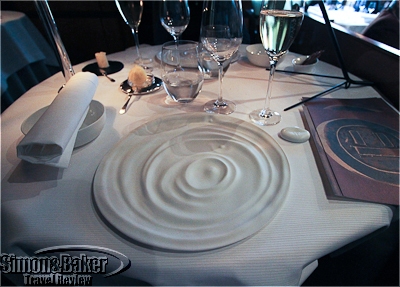
The place setting at Le Balzac
Our arrival at Le Balzac, a few strides away from the famed Champs Elysees Avenue in Paris, France, was easy. A handful of steps led to the rarefied ambiance of one of the city’s best known gourmet addresses. Although the restaurant has its own entrance it is shares space and restrooms with a luxury hotel. Inside, we were greeted by a polite staff person who made sure we were in the reservations list. After handing our coats to someone, we followed a staff person, past the bar and through the dining room, to our table.
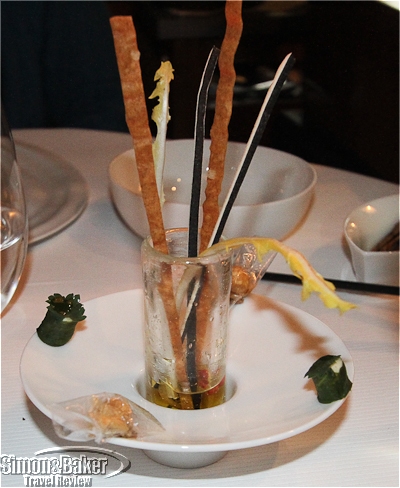
The crunchy cheese and paprika bites, vegetable lengths with balls wrapped in lettuce
The contemporary dining room, decorated in muted shades of brown with recessed ceiling lights, was divided into two sections, the main dining area and a secondary room a step or two above the larger space. Our small table occupied the corner nearest the steps, affording us a view of the entire dining room and bar. Crisp tablecloths and napkins, elegant dinnerware and glassware set the stage for a special meal.
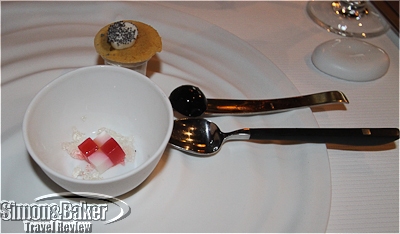
The amuse bouche of gel cubes, tomato, squid ink and tuna
Initially the staff were efficient and polite, bringing us drinks, a copy of the menu, water and bread (chestnut, milk or baguette choices). Crunchy cheese and paprika bites, vegetable lengths with balls wrapped in lettuce were followed by gel cubes, tomato and squid ink and tuna morsels. The Alsatian bread was to our liking.
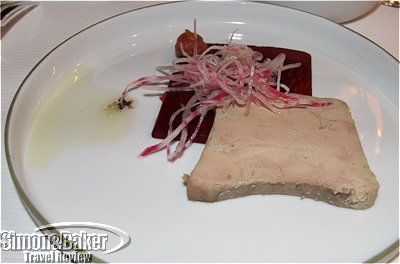
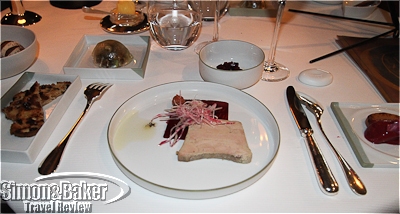
The foie gras and accompaniments
Our first course, Foie gras d’oie eau de bortsch en gelee, pate de coing au marc de Gewurztraminer Salade Felicia. Creme glacee tamarillo/Beaujolais nouveau/chou rouge, tranche de rutabaga grille, puntarella (goose foie gras with tomato and beetroot, borsch, beetroot foam and puree and citrus butter) served with a floral wine from Austria was outstanding. After that, the experience and the meal declined in a remarkable manner.
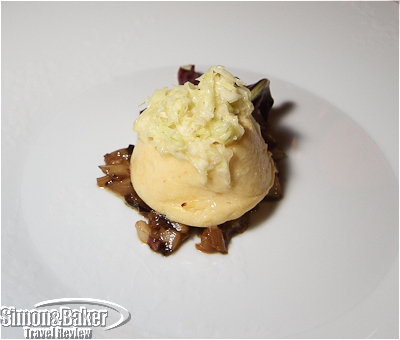
The souffle of haddock
Souffle haddock/Saint-Jacques chou blanc croquant fondue d’endive et radicchio. Noix tailees aux chataignes, puree de brocoli au raifort was the second course. The souffle of haddock was more of a mousse than a souffle and the flavor was disappointing. The Grosse poularde de Bresse rotie entiere le supreme est enrobe du jus de cuisson lie de tamrain, oignons grelots, vuleta, topinambours. Le gras de cuisse croustillant, gratin de poire, celeri-rave et crozets au Blue de Termignon, a large hen roasted whole with pear gratin and blue cheese from Termignon was oily and bland despite an excess of cheese.
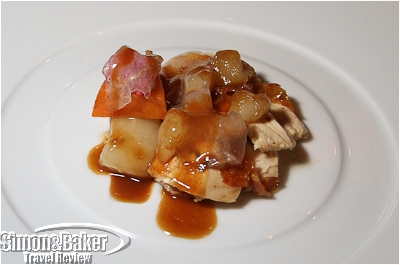
Hen roasted with pear gratin and blue cheese.
For some reason the service level dropped steeply after the appetizer. Our bread plate remained empty for a long time as did our wine and water glasses despite our calling the server to our table. Rather than refilling our wine glasses or asking if we wished to try something else, he called the wine steward who had been chatting with our nearest neighbor for the better part of thirty minutes in such a loud voice that we could hear his part of their conversation. A few minutes later, the man disentangled himself and took the two steps to reach our table. By then, we no longer wanted any wine.
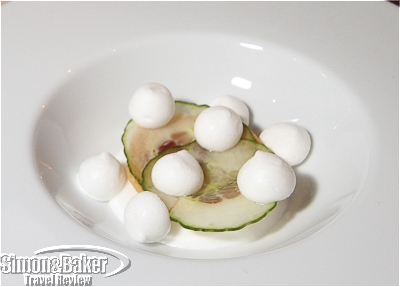
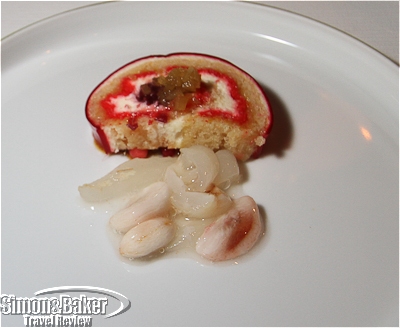
The desserts
Dessert did nothing to improve the situation. It was the first time I ever remember leaving a top rated restaurant hungry and so unhappy with the service.
by Editor | May 12, 2014 | Accomodations, Ecotourism, New Articles
Article and photos by Josette King
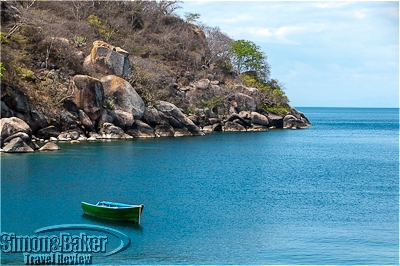
The view from my tent at Mumbo Island
When I first heard of Malawi, in the earliest days of my love affair with Africa over a decade ago, I confess that I had to consult an atlas to locate the small landlocked country wedged into the southern end of the East African Rift Valley. Less than 900 kilometers (560 miles) from north to south and barely 160 kilometers (100 miles) at its widest, Malawi was overshadowed by its much larger neighbors, Tanzania to the north, Zambia and Mozambique to the south, east and west. It was, and remains as of this writing, mainly unnoticed by international tourism travelers. Yet this narrow strip of rugged terrain carved by the Great Rift Valley is rich in spectacular vistas and home to several national parks, and of course Lake Malawi, known by the most passionate divers and water sports enthusiasts. It is the third largest of the African lakes, and for some arguably the most beautiful.
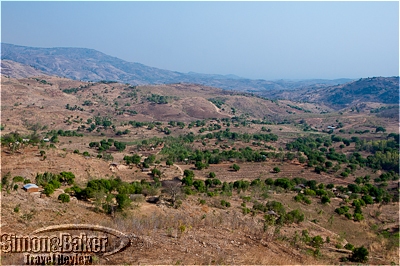
Great swaths of the country were used for subsistence agriculture
It is also one of the poorest countries in Africa, and one for whom the development of a viable tourism industry is an important growth and indeed survival factor. It was this opportunity to have it all, to visit, and through that support a country in the early stages of modern development as well as enjoy a safari off the beaten track, and experience a remote tropical beach environment known by many in the region, but rarely visited by international travelers, all within a few hours’ drive that made Malawi an irresistible destination for my most recent African visit.
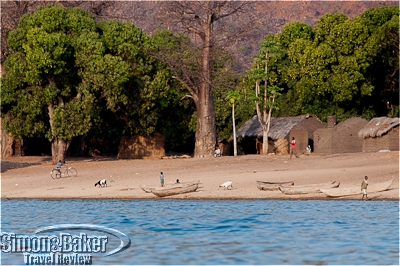
The shores of Lake Malawi were dotted with fishing villages
Reaching Malawi had its challenges. With a population of 16 million living mainly in rural areas, and an economy largely based on subsistence agriculture, it is one the least developed countries in Africa, with only the most rudimentary national infrastructure. And what of the tourism infrastructure? I needn’t have worried. A few forward thinking properties have established themselves in recent years, ranging from unabashedly off the grid to luxury class, in the most desirable tourism destinations in the country. Each had a unique personality that was just right to ensure optimum enjoyment of it surroundings. One constant however, throughout my visit to the peaceful little country was the warm welcome of the gentle people of Malawi.
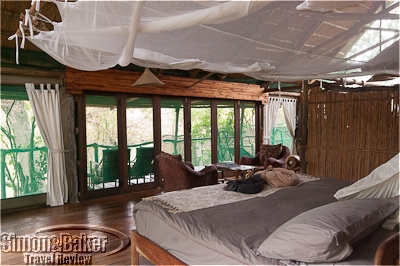
The king size bed at Mvuu faced the deck and the bush
From a luxury safari perspective, Malawi is for people who want a bit of real world authenticity with their posh African safari.
Mvuu Lodge in Liwonde National Park, considered the premier park in Malawi for its large population of hippos and elephants and its abundant bird life, offered intimate wilderness tented accommodations with a casual atmosphere and the creature comforts I have come to expect from a luxury safari property. Ideally located at the edge of a secluded lagoon across the Shire River from the park entrance, it could be reached only by boat. The open sided main area was raised high into the trees for a sweeping view of the constant wildlife activity along the lagoon. The riverside location allowed for a mix of cruises and drives that provided a close and varied view of the game as it went about its daily life. The highpoint of my stay was a perfect morning on the river, when we came across a bachelor herd of elephants, one of them sound asleep (yes, elephants can sleep laying down), then spent a memorable hour watching their antics as they horsed around in the middle of the river like teenagers at the beach.
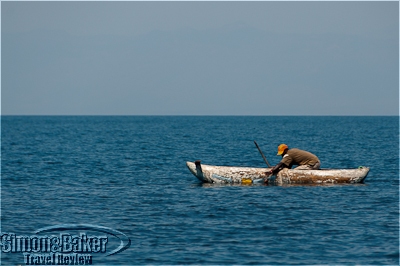
A local fisherman casting his net from a dugout canoe
Some 580 kilometer (360 mile) long, Lake Malawi is the main topographic icon of the country. It is internationally renowned among water sports enthusiasts and naturalists for its pristine shores and deserted islands nestled between towering boulders rising straight from crystal clear waters alive with small brightly colored fish. The beauty of the scenery and the hundreds of endemic species of cichlids fish drove the Malawi government to set aside the southern end the lake as Lake Malawi National Park in 1980. It was the first fresh water marine reserve in the world, and then in 1984 it became a UNESCO World Heritage Site.
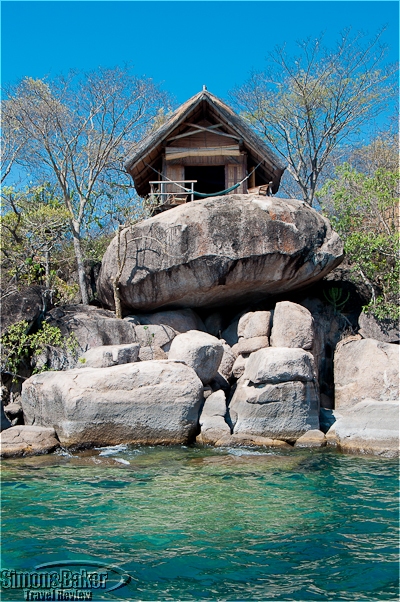
My tent was a reed and thatch bungalow high above the lake
An hour’s motorboat ride off shore from Cape Maclear, Mumbo Island was a pristine one square kilometer (250 acres) dot of granitic rock topped by lush miombo woodland and blessed with a crescent beach of golden sand. Until the National Parks authorities first awarded Kayak Africa the exclusive rights to operate tourism accommodations on the island in 1996, it had never been populated. To preserve its unspoiled beauty, Kayak Africa created Mumbo Island Camp, a minimalist property run on uncompromising sustainable principles. It consisted of rustic bungalows of reed and thatch with comfortable beds, bucket showers and “eco-loos,” perched high in the rocks to better admire the dazzling waters of the lake, a dining area that served wholesome, simple foods, and in a corner of the beach, a water sports gazebo. There was no electricity, just solar and paraffin lamps and wind up flashlights. What did I like best? The dawn wake up call of a red billed hornbill enthusiastically welcoming the sunrise, and snorkeling in warm waters so clear I could see the outlines of underwater boulders deep beneath me, bright cichlids darting about them, and kayak rides to watch the sun dip into the lake, and… well, everything. The ultimate luxury of Mumbo Island Camp was its very existence.
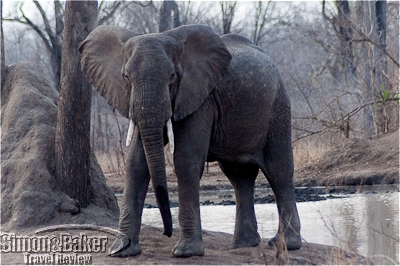
Elephants were a common sight at Mkulumadzi
Mkulumadzi, the sole property in Majete Game Reserve, the recently reborn only Big Five game park in Malawi on the Lower Shire River; and Pumulani, on the western side of the Nankumba Peninsula at the edge of the Lake Malawi National Park, were sister properties designed for Robin Pope Safaris by G. Hooft Graafland, a Dutch architect. These innovative world class luxury lodges sat gently upon the land, each guest accommodation custom designed to fit into the topographic elements of its environment, and covered with a roof of endemic vegetation to help offset its own carbon footprint and regulate inside temperatures.
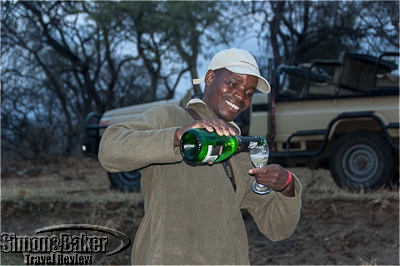
Samuel Chihana pours a sundowner drinks for us
While the properties had their distinct character best adapted to their purpose, both were decorated in an elegantly understated contemporary style that offered optimum comfort without ever distracting from their breathtaking surroundings. Each had its own trademark feature. At Mkulumadzi, the wilderness lodge, it was the impressively engineered 88 meter (290 foot) suspension foot bridge that led across the river to the property’s entrance. It never failed to deliver new game viewing opportunities and make me feel like an explorer of a bygone era.
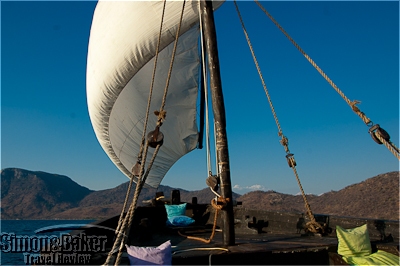
The traditional dhow sailed around the lake
At Pumulani, the lakeside beach lodge, the unique feature was the authentic, hand built wooden dhow with a triangular sail, reminiscent of the days when Arab traders plied the waters of the lake, always ready to take me on a breakfast or sunset cruise. And best of all, along with exceptional memories I took away the satisfaction to have experienced two properties in harmony with my responsible tourism ethos.
But that was no surprise. On one of my early visits to Zambia many years ago, I had the good fortune to meet Robin and Jo, the founders of Robin Pope Safaris. It was a conversation that went a long way to opening my mind to the power of responsible tourism as a tool for sustainable development in Africa and beyond.
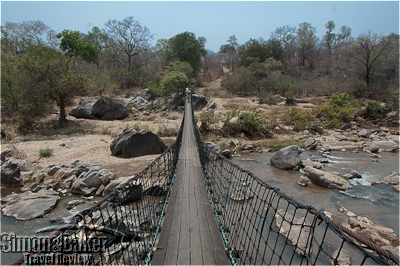
The lodge was reached via a suspension footbridge over the Mkulumadzi River
These two premier properties, relatively recently opened in a country still in the early stages of development were an ideal opportunity to experience first hand the contribution that the presence of my fellow tourists and I were making to the protection of previously at risk wilderness areas, while helping to alleviate poverty through good local employment practices, and the involvement of the local communities. I was delighted to hear that Pumulani was recognized as Malawi’s leading hotel at the 2011 and 2012 World Travel Awards.



























